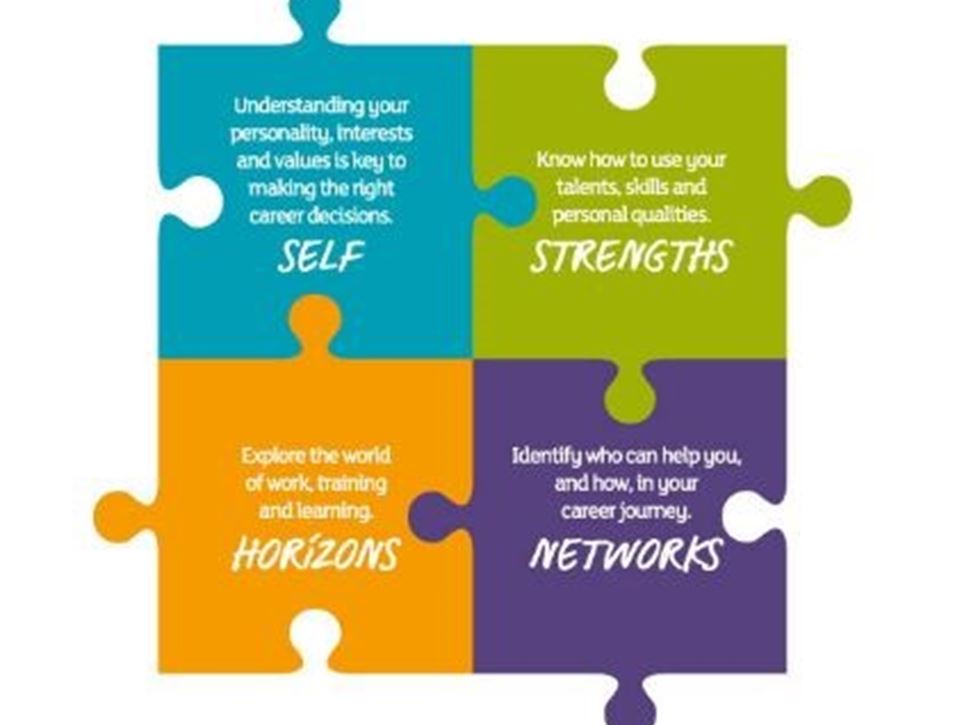You need to confirm you are over the age of 25 and living in Scotland
Career Management Skills (CMS)
Well-developed Career Management Skills empower people at any stage in life to take control of their career.
Well-developed Career Management Skills (CMS) empower people at any stage in life to take control of their career. They can help you take control when you are facing change in your working life.
Career Management Skills are skills for life which can be acquired at a variety of points and in a range of contexts as illustrated below. They help you make effective decisions and realise your potential at these key stages:
- before starting work
- moving from education to work
- when you’re not working
- preparing to leave or reduce work
Career Management Skills strengthen your understanding of self, strengths, horizons and networks to help you take control of your future:
Self: Understanding your personality, interests and values is key to making the right career decisions
Strengths: Knowing how to describe and use your talents, skills and personal qualities can lead to successful transitions
Horizons: Exploring the world of work, training and learning helps your understanding of all the options open to you
Networks: Identifying who can assist you, and how, in your career journey will make progression easier
Dealing with changes in your career
A key aspect of today’s job market is that people may not stay in the same job for life. You may experience, or be forced to consider, a change of job or career on more than one occasion throughout your working life.
Redundancy can affect all sectors and levels of the labour market so a change of job or career may be a necessity rather than a choice.
Where people do stay with the same employer there can be opportunities to progress within the workplace. Also, advances in technology or changes to working practices may mean a job role can alter or even disappear leading to a need for retraining.
People may experience time away from the labour market for a variety of reasons, for example to care for a relative or due to illness. A return to work may involve a change of job or employer.
Many people choose to continue working after the age at which they can retire. Sometimes people cannot afford to retire when they would like to. Often, however, it is a chance to refocus your career, for example by working part-time or taking on less responsibilities.
Redundancy
You may be facing redundancy at present. You will no doubt be going through a wide range of emotions and may not be sure how to deal with them.
You’ve probably asked yourself a number of questions:
- what happens now?
- what else can I do?
- how am I going to find a new job?
There are ways you can use your feelings positively to move on to new opportunities.
Development within the workplace
The job market is changing all the time so it’s important that you review your skills and qualifications at regular intervals. This goes hand-in-hand with continuously developing your skills. The fact that you want to continue in your position does not mean that you cannot develop within it. However, you have a shared responsibility with your employer to identify areas for development.
You might also feel stale in your current situation and that it might be time for a change – but you’re not sure what to do about this.
- could you move into a different job within your organisation?
- should you think about a new career or employer?
- how can you re-train?
You can address these questions through a step by step process. This process involves identifying how you feel at present, what you have to offer and how to address any gaps in your skills or experience.
Returning to work after a break
If you have been out of the labour market for any length of time, a return to work after a break can be daunting. You may be concerned that your skills and knowledge are out of date or even that the ways to find work have changed. Getting the right support can help.
It helps to understand what you have to offer and that many of the skills and strengths gained during time away from the workplace are transferable and relevant.
Retirement
Retirement is a major life event. You may have to make decisions about work and careers, leisure, health, family and finance. You will have to adapt and adjust to changes in lifestyle, social contacts and relationships. As you approach retirement you will need a great deal of information and advice to help plan for the future.
It is useful to work through any issues, identify what is important to you and where work fits into your life.
Some other articles you may find helpful
What are your values?
It’s important to know what’s important to you as you enter the world of work.
